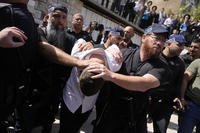The U.S. Army is pushing back against calls for an independent panel to analyze its proposal to restructure aviation units in part by transferring Apache attack helicopters from the National Guard.
"We believe that such a commission in unnecessary," Army Chief of Staff Gen. Raymond Odierno said on Tuesday during a hearing of the Senate Armed Services Committee. He later described the issue as a "family spat" over money.
The Army wants to save an estimated $12 billion over several years by retiring OH-58 Kiowas and using AH-64 Apaches for the armed scout and reconnaissance mission. Because the service can't afford to buy more attack choppers to do both missions, it would transfer the Guard's entire fleet of 192 Apaches to the active component. In return, the Guard would receive 111 UH-60 Black Hawk utility helicopters from the active component.
The controversial proposal has drawn scrutiny from Guard leaders and lawmakers, including Rep. Joe Wilson, R-S.C., who introduced legislation in the House to create a national commission to study the Army's plan to restructure its forces, particularly aviation units.
"This restructuring also significantly reduces personnel, many of whom are aviation personnel with years of experience as either pilots or in aircraft maintenance," Wilson said in a statement announcing the bill, H.R. 3930. "Over 6,000 of these personnel, whom the Army has invested significant time and money, will be forced out of a job and will be cut from the Army National Guard as a result of this proposal. Such a restructuring cannot and should not be rushed."
Odierno testified at Tuesday's Senate hearing alongside Gen. Frank Grass, chief of the National Guard Bureau, and Lt. Gen. Jeffrey Talley, chief of the Army Reserve. When asked for their thoughts by Sen. Carl Levin, D-Mich., the committee chairman, Talley sided with Odierno in opposing the creation of a commission, while Grass supported the idea.
"As we look to 2023, and with the fiscal realities we're facing, I mean, who would not want an independent look?" Grass said. "This committee, that's going to have to help us through this, I would think you would want an independent look, as well."
While he praised the work of an Air Force task force that was created last year to look into how the service could better integrate its active duty, Air National Guard and Reserve components after more than a decade of war and amid automatic budget cuts, Grass also seemed resigned to accept the Army proposal.
"As a member of the Joint Chiefs of Staff, we have fought and we have discussed many, many times these topics," Grass said. "I provided my best military advice. I've assessed the risk. I've given the cost. But the decision's been made, Mr. Chairman, and my job now is to begin to look at the effects across the states and figure out how we're going to execute this plan."
In addition to Apaches, the Guard would also lose 30 OH-58D Kiowa Warriors. Under the original plan, the Guard would have also lost as many as 104 UH-72 Lakotas. But that has since been revised, and the active component now plans to purchase those helicopters instead, according to Lt. Col. Don Peters, an Army spokesman at the Pentagon.
Odierno acknowledged the aviation overhaul was a difficult decision. He noted that the active component is losing three aviation brigades, while the reserve component isn’t losing any. He also pointed out that Black Hawks flew more than any other combat aircraft during the last decade of wars in Iraq and Afghanistan.
Odierno said the proposal has been approved by combatant commanders and members of the Joint Chiefs of Staff, as well as Army Secretary John McHugh and Defense Secretary Chuck Hagel. Delaying a decision by creating a commission would cost the service about $1 billion a year, he said.
"No one is fully satisfied with the final outcome, including myself," Odierno said. "However, the reality is the funding in the future will not allow us to have everything we may want. These cuts will still occur, even if we delay our decisions or fail to address the issue as the total Army. The results will be hollowing out of our Army. Our soldiers will be less prepared and this will cost more lives in the next conflict."
In general, members of the committee seemed supportive of the Army's proposal and cool to the idea of establishing a committee to review the issue.
(Story was updated to add comments from Army spokesman in the 10th paragraph about revised Lakota plan.)
Associate Editor Brendan McGarry can be reached at brendan.mcgarry@monster.com.








